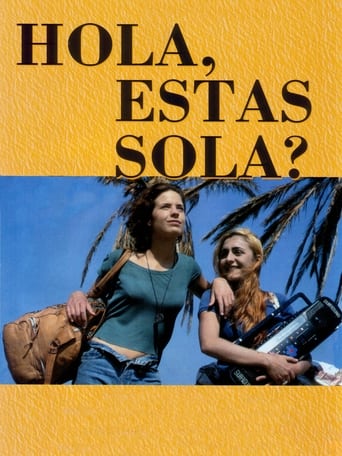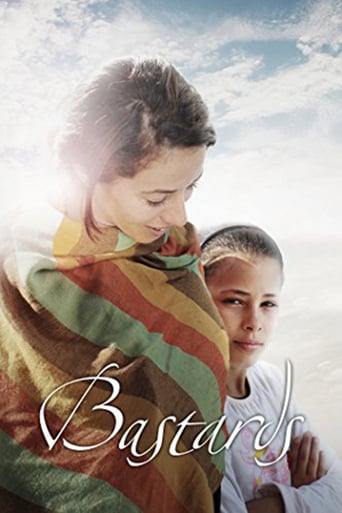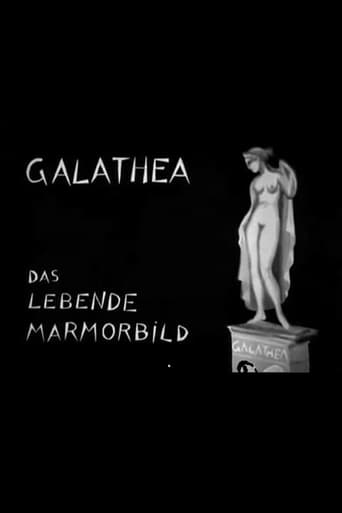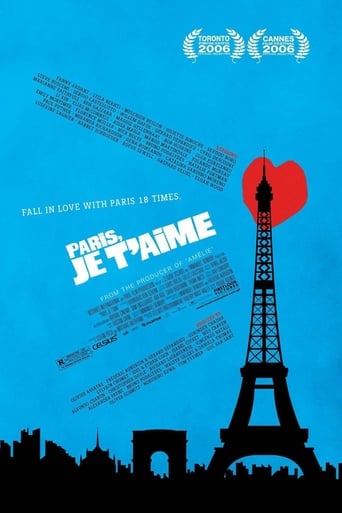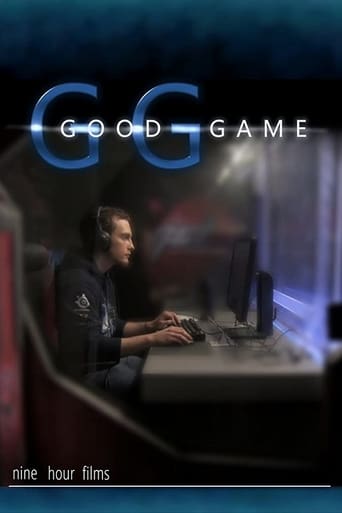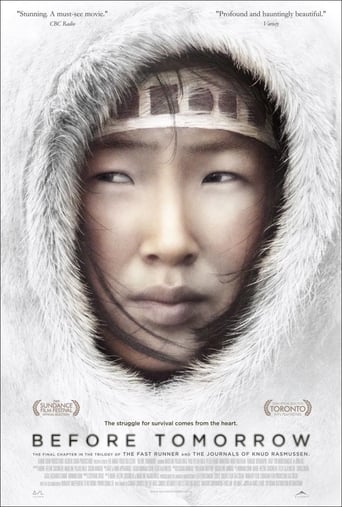

Before Tomorrow (2008)
Two isolated families meet for a summertime celebration. Food is abundant and the future seems bright, but Ningiuq, a wise old woman, sees her world as fragile and moves through it with a pervasive sense of dread. Ningiuq and her grandson Maniq are dropped off on a remote island, where, every year, the family dries the catch and stores it for winter. The task is soon finished. As summer turns to fall, they wait in vain for the others to pick them up. Written by Anonymous (IMDb.com)
Watch Trailer
Cast


Similar titles
Reviews
Plenty to Like, Plenty to Dislike
Perfectly adorable
Memorable, crazy movie
For all the hype it got I was expecting a lot more!
Oral history and storytelling enables the past, present, future, and mythical realms to exist simultaneously alongside light-cultivator Ningiuq, providing her the lessons and strength and wisdom she needs to carry her grandson Maniq through each and every moment of their existenceFaces are topological atlases mapping tundraInfinitely boundless trackless isolated snowsplendant glacially-suncupped sastrugied panoramas magnify climatic extremity and timelessness and cosmic uncertaintyThe Sun's caravel of light disconcernedly aureates their earth, our earth, in titian goldA watery womb of emerald sunlight shimmers under the water, winking endlessly back onto itselfThe point of a needle needles out of the fabric of existence an entire population of Inuit (except for Ningiuq and Maniq), a devastating history reduced to an exclamation point, its intensity viscerally experienced in sweeping panoramas of empty snowscapesA woman lights the quilliq and a woman keeps the fire burning and another woman hundreds of years later turned on a camera light and keeps the fire burningA raven flew over a beach. Suddenly a bowhead whale surfaced and swallowed it whole. Inside the whale it was very dark. Like a cave. In the distance the raven saw the flickering light of an oil lamp.A girl was trying desperately to keep the light from dying.The raven heard the girl's voice: "You must be faithful to me. Promise never to touch this light."The raven promised, "I'll never touch it."But when the girl returned to her work the raven forgot his promise and touched the lamp, and when the light went out, the girl fell over, dead. The raven realized his terrible mistake. The girl had taken possession of the raven's soul and when the light went out, so did the raven's heart.I just had a dream. It was a beautiful dream. Of little children. I was pregnant. One was a human being, the other looked like a bear club. I loved them both. But I loved one more than the other, I don't know why. I took a harpoon and pierced the cub on its back. It died right away. The human child shrank until it vanished. And went back into my womb. I understand my dream. I really wanted to bear a child myself, but I adopted one. It felt like he was my own. I love him very much.I have heard that they haven't always been ptarmigans. There was an old woman and her grandson who were all alone, maybe like us. When the grandson went to bed he asked his grandmother to tell a story. "Grandmother, please tell me a story." "I don't have any stories, get comfortable and go to sleep." But the child insisted and started to cry, "Grandmother tell me a story."Finally, the grandmother started to tell: "Story, Story....Bay lemmings....having no fur....arms folded in.... start falling....feels ticklish."The grandson was so startled, he shouted "teeook!" and flew off.He turned into a snow bunting and flew away right out the air hole.The grandmother looked all around and said, "Grandson, where did you go?" Again and again, "Where are you?"Then she cried so much, and she wiped her eyes so much, that her eyes turned red, but she couldn't find him. Finally, she put her needles in her boots.Then she took her oil lamp wick and hung it around her neck. That's the collar filled with seeds around the ptarmigan's neck.And then she went, "Ap-ap-ap-ap-ap!" And flew off to join her grandson. He was so startled he turned into a snow bunting.She went flying right out after him. Too bad! But it must have been all right as long as they were together again. That the end of that story.We are meat, we are spiritWe have blood and we have graceWe have a will and we have muscleA soul and a faceWhy must we dieWe have eyes and intuitionA DNA code and a nameSome tend to logic, some superstitionWe have an aura and a frameWhy must we dieWe are human, we are angelWe have feet and wish for wingsWe are carbon, we are etherWe are saints, we are kingsWhy must we dieWhy must we dieWe are men of constant sorrowWe'll have trouble all our daysWe never found our EldoradoWhere we were bornWe are meat, we are spiritWe have blood and we have graceWe have a will and we have muscleA soul and a faceWhy must we dieWhy must we dieWe are men of constant sorrowWe'll have trouble all our daysWe never found our EldoradoWhere we were bornWe are men of constant sorrowWe'll have trouble all our days
I think the first rule of storytelling is to have a story to tell.And while there is just the barest story to tell in this film, it takes an excruciatingly long time to tell it. This could easily have been cut down by half, or perhaps even made into a short film, and resulted in a far better film.I actually do think this film is much better than other boredom greats, such as Die Salzmänner von Tibet (1997) (The Saltmen of Tibet), and Last Days (2005). But if you liked this film, then you'll probably love those, because even less happens in those films.I also feel that something must have gone wrong in the translation. In English, nobody tells people that they are "able". Words like "capable", "resourceful", "skilled", or "grown up" would have been better. Also, several times people were speaking, but no translation was provided at all. I suspect they weren't saying much, because their language seems to be tremendously slow and wordy, but the viewer deserves to know what they were saying, given that almost nothing else is happening.It's unclear what time-period this film is supposed to represent. I'm guessing it's supposed to be from over 100 years ago, but who knows?Last, I found the song "Why Must We Die" to be very out-of-place. First, the singer is presumably not one of them, so "we" is incorrect. Second, the song makes reference to carbon and DNA. But she's singing about people who have never even seen metal before, much less studied chemistry and biology. Last, the obvious answer to the question is: to make room for the next generation. If everyone lived forever, we'd already have killed the planet decades ago. Sorry, but it's just a stupid, stupid song, so over-romanticized, condescending, and sounds like it was written by committee.
This is a film about what the Inuit lived like before the arrival of Europeans, and what happened after they arrived to one small community, through the eyes of the survivors. This is not some grand epic, but rather a slow and very intimate story which is filled with great sadness. At first, we hear that the story is being narrated from the point of view of one grandmother (Ningiuq) to her husband at some point in the future, which gives us a sense of comfort that everything will turn out well in the end.Ningiuq is the main focus of the story, as well as her grandson Maniq. The first part of the film starts in a pre-contact Inuit village, and lets us meet all of its colourful characters. What struck me during this part of the film and what followed was how much I could relate with everyone. It is such a human film, much more so than most films nowadays. ***SPOILERS begin here***One man tells of how his family met some people in strange boats far away from the village who met them and offered to trade metal needles (far sharper than anything the Inuit own) in return for sleeping with their women. The women wanted the needles...In any case, winter is coming on, and provisions caught over the summer must be dried. Men from the Inuit village transport Ningiuq, her best friend Kutuujuk and her grandson Maniq over to an island where the three of them will dry the fish that the village has caught over the summer. Before he goes, Maniq's father hands him his harpoon and tells him that when he gets back, he will take him hunting for the first time. On the island, Kutuujuk gets ill and dies. Maniq becomes proficient with the harpoon and even catches his first seal. Ningiuq and Maniq wait for the boat to come, but fall is closing in. Finally, unable to wait any longer, they take their canoe and start the journey back themselves.A horrible sight meets them back at the village. A European disease has broken out, and no-one is left alive. They decide to go back to the island where they stored some food, taking two puppies with them. Though their tent has broken down, they find a cave where they shelter through the long winter. Ningiuq sings songs and tells stories to Maniq, and Maniq dreams of making the two little pups his sled dogs. Ningiuq says that she knows of a beautiful place to the south where there are many people and children, but that the path there is long and very difficult. They are attacked by wolves, and Ningiuq is wounded. Towards the end, the film gets slower and slower, and Ningiuq begins repeating the same things to Maniq ("you're my grandson, you're so skilled, and I love you very much"). Finally, we see her talking to herself (but as if she were talking to her husband) and realize that her narration throughout the early part of the film was not from some comfortable happy ending, but from this desperate, lonely and not very hopeful situation.Does the wonderful place in the south really exist? Will they ever get there? That's beyond the scope of this film, which is about the journey and not the destination.***SPOILERS end here***The acting and direction here are fantastic, and indeed it's one of those films that really gets you deep down. The music is a bit hit-and-miss, and I felt that the song which plays at the beginning and end ("Why Must We Die?") beats you over the head with the point a bit too much.I think that most people will like the film, though. The one snag is that it is sometimes very slow, which is something that I've seen in all the Inuit films - the sense of pacing is just much slower in general than in the modern West. But at least it is slow and intimate rather than slow and aloof. I could not stand it if it were the latter.
There is a lot of natural charm in any Inuit film, like Atanarjuat ("Fast Runner") or this one. Seeing people dealing mainly with simple survival tasks gives a strong "no-bull@#$%" sense, and gets you to believe what's happening on the screen much more than you would with any other film. It all looks authentic and true.Add to this some great Arctic scenery, and you can easily have a winner. But still...The storyline is a bit choppy, with things just taking too long or too short to happen. Many scenes are enormously long relative to what's happening. Camera work seems to favor close-ups too much (or maybe that's me - I was sitting way too close). The ending left me completely confused as to what the authors were trying to say here.On the positive side, I'm happy the creators didn't get carried away with too much action (hunting etc), with some more complex things left out of the frame. It didn't harm the movie at all, contrary to what people may think after seeing too much Hollywood movies.Even though I gave this one four stars, I will go see another film from the same creators if and when it comes out.


